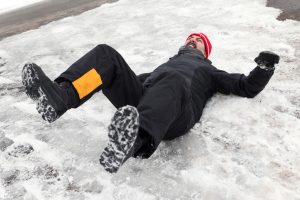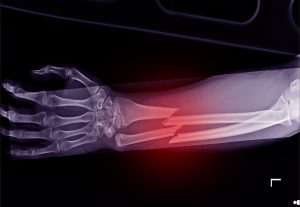If you sustained an injury in a slip and fall on ice at work, you may wonder whether you could claim compensation. In this article, we examine accident at work claims.
You must satisfy the personal injury claims eligibility criteria in order to seek compensation from your employer. We explain what this is and look at injuries you could suffer falling on ice.
Additionally, this article provides information about how compensation could be awarded in a successful claim for a workplace accident.
Making an accident at work claim can seem stressful, so we always advise seeking advice from a personal injury specialist. To conclude this guide, we take a look at the benefits of having a solicitor represent you under No Win No Fee terms.
If you have any questions about claiming slip on ice compensation, speak to a member of our personal injury team. To discuss slip and fall accident claims:
- Call 020 8050 2736
- Request a call back using our claim online form.
- Ask, ‘I slipped on ice at work, can I sue?’ in our live chat.
Select A Section
- How To Claim For A Slip And Fall On Ice At Work
- What Injuries Could Be Caused By Falling On Ice At Work?
- How Do I Claim After I Slipped On Ice At Work?
- How Much Compensation After Falling On Ice At Work?
- Why Claim For A Slip And Fall Accident On A No Win No Fee Basis?
- Learn More About Claiming After A Slip And Fall On Ice At Work
How To Claim For A Slip And Fall On Ice At Work
You might be eligible for compensation if you sustain injuries in a slip and fall on ice at work. While you are in the workplace, your employer must take reasonable steps to ensure your health, safety and welfare. This is their duty of care as set out in the Health and Safety at Work etc. Act 1974 (HASAWA). As part of this duty, your employer is expected to ensure a good standard of housekeeping. This includes ensuring that icy surfaces, including in employee car parks, are either cleared, gritted or sign-posted.
To have good grounds to claim for a fall at work, you must meet the personal injury claims eligibility criteria. This means that you must prove:
- You were owed a duty of care.
- There was a breach of duty.
- You suffered injuries because of this breach.
A member of our advisory team can help assess whether you have valid grounds to file a claim against your employer.
What Injuries Could Be Caused By Falling On Ice At Work?
Slipping and falling on ice can lead to an accident in which serious injuries can be suffered. If an employer is responsible for an area in which ice can form, it is important that this is gritted or sign-posted in such severe weather conditions.
Examples of injuries caused by slipping on ice include:
- Back injury.
- Broken arm.
- Wrist injury.
- Neck injury.
- Head injury.
- Ankle injury.
To discuss the injury you suffered falling on ice and whether you can claim compensation, get in touch with our advisory team.
How Do I Claim After I Slipped On Ice At Work?
As part of the personal injury claims process, you must have sufficient evidence. This needs to show liability for your injuries. Examples of evidence that could be useful for an accident at work claim include:
- Accident report. Your employer is legally obligated to have an accident book if they employ ten or more staff members. This should be filled in with your name, the time and date and accident details.
- Medical reports. A copy of your medical records can help illustrate the nature of the injuries you suffered slipping on ice and the required treatment. Additionally, they may contain information about your prognosis. For example, details about whether you are likely to make a full recovery following a head injury.
- Video footage. You can request CCTV footage if your fall on ice was captured in this way.
- Witness details. If you make a note of the contact details of anyone who saw you slipping on ice and they can be contacted later in the claims process to give a witness statement.
- Photographs. If you have any pictures, you can submit images of the icy surface or any visible injuries.
What Is The Time Limit To Claim Slip On Ice Compensation?
If you intend on filing an accident at work claim for injuries suffered in a fall on ice, you must do so before the 3-year time limit expires. This is set by the Limitation Act 1980 and begins on the day the incident happened. However, in certain cases, this limitation period is suspended. To learn more, contact a member of the team.
How Much Compensation After Falling On Ice At Work?
If you make a successful claim for injuries suffered during a slip and fall on ice at work, your settlement could consist of two parts. These are general and special damages.
General damages compensate for the physical pain and mental suffering caused by the slip and fall accident. Those responsible for valuing accident at work claims may refer to the compensation guidelines from the Judicial College (JCG).
In our table below we look at how compensation could be awarded in a successful personal injury claim. The top row provides a figure for multiple serious injuries plus special damages. The remaining rows contain figures from the JCG. It should be noted that the figure in the top row is not from the JCG. Due to the difference between claims, the table is only for guidance.
| Injury | Severity | Notes | Guideline Compensation |
|---|---|---|---|
| Multiple Severe Injuries and Incurred Costs | Very Serious | Settlements could compensate for more than one serious injury and incurred expenses, such as lost earnings and home help. | Up to £350,000+ |
| Back Injury | Severe (i) | These injuries result in severe pain and disability, alongside a combination of sexual functioning impairments, problems and impairments with the bowel and bladder and incomplete paralysis. | £91,090 to £160,980 |
| Back Injury | Moderate (ii) | Many back injuries that are frequently encountered are included in this bracket, such as backache from the disturbance of muscles and ligaments. | £12,510 to £27,760 |
| Head Injury | Moderate (iii) | The claimant suffers problems with concentration and memory, along with a reduced work ability and small epilepsy risk. | £43,060 to £90,720 |
| Arm Injury | Permanent and Substantial Disablement | The claimant sustained serious fractures to one or both forearms that caused a significant and permanent disability. | £39,170 to £59,860 |
| Arm Injury | Less Severe | A substantial recovery is either expected or already occurred, although there were significant disabilities. | £19,200 to £39,170 |
| Neck Injury | Severe (iii) | These injuries cause chronic conditions and significant permanent disability and include fractures, dislocations and severe soft tissue damage. | £45,470 to £55,990 |
| Ankle Injury | Severe | The claimant required extensive treatment and has a significant residual disability from the injury. | £31,310 to £50,060 |
| Wrist Injury | Significant | The injured person still has some useful movement, but has a significant permanent disability. | £24,500 to £39,170 |
| Wrist Injury | Less Severe | These injuries cause some permanent disability, such as persisting pain and stiffness. | £12,590 to £24,500 |
Additionally, you could be reimbursed for costs related to the injury suffered in a slip and fall accident. This is under special damages. Examples of expenses you could be compensated for include:
- Lost earnings.
- Medical expenses.
- Home help.
- Mobility aids.
As part of the claims process, you will be expected to prove your expenses. You could submit receipts, invoices, wage slips or any other documentation showing your out-of-pocket expenses.
If you would like to know more about how compensation is awarded in a successful claim or would like a free valuation of your potential personal injury compensation, speak to a member of our advisory team.
Why Claim For A Slip And Fall Accident On A No Win No Fee Basis?
If you are seeking compensation for injuries sustained in a slip and fall on ice at work, you may want the support of a solicitor during the claims process. One of the specialist personal injury solicitors from our panel could help you with your workplace accident claim. Our panel usually provide services under a type of No Win No Fee agreement called a Conditional Fee Agreement (CFA).
When your personal injury solicitor offers a No Win No Fee service, they:
- Won’t take an upfront payment.
- Ask you to pay for ongoing costs.
- Only take a success fee if you are awarded compensation. This amount is a legally capped percentage.
- Won’t ask you to pay this fee should your claim fail.
If you would like to discuss slip on ice compensation, please contact an advisor from our team. You could also be connected to one of the personal injury solicitors from our panel if you have an eligible claim.
To discuss slip and fall accident claims:
- Call 020 8050 2736
- Fill in our claim online form for a call back.
- Use our live chat to ask, “I slipped on ice at work, can I sue?”
Learn More About Claiming After A Slip And Fall On Ice At Work
Additional guides about accident at work compensation:
- Guidance on making a serious work injury claim and how much compensation could be awarded.
- Information about claiming with a No Win No Fee solicitor for your workplace injury.
- Details about compensation for a psychological injury at work.
External resources that you might find helpful:
- Guidance for workers on health and safety from the Health and Safety Executive.
- Details about first aid from the NHS.
- Information about claiming statutory sick pay (SSP) from the government.
Speak to one of our advisors if you have any further questions about how to claim compensation for injuries suffered in a slip and fall on ice at work.




